Hong Kong activists are planning to take advantage of forthcoming opportunities to counter the recent crackdown on the pro-democracy movement. “We’re only at half-time in the match,” one activist suggested. But Beijing appears equally determined to score a definitive victory by effectively revoking the “one country, two systems” framework, an online forum heard today.
“Beijing looks ready to step up mass disqualifications of lawmakers ahead of the Legislative Council elections,” said one participant. “This would be a substantial escalation, particularly as those who look set to be targeted have never advocated for self-determination.”
 The principal challenge for defending Hong Kong’s autonomy and civic freedoms is maintaining and enforcing the Basic Law and, as an international treaty, it’s breach should be raised at the UN Security Council, the forum – hosted by Hong Kong Watch – heard. But Beijing had also violated several international obligations in the course of covering up the virus outbreak in Wuhan and while there is a demonstrable legal case to be made, there are questions over whether other states, including leading democracies, have the political will to confront Beijing.
The principal challenge for defending Hong Kong’s autonomy and civic freedoms is maintaining and enforcing the Basic Law and, as an international treaty, it’s breach should be raised at the UN Security Council, the forum – hosted by Hong Kong Watch – heard. But Beijing had also violated several international obligations in the course of covering up the virus outbreak in Wuhan and while there is a demonstrable legal case to be made, there are questions over whether other states, including leading democracies, have the political will to confront Beijing.
The private briefing session, which connected senior US Congressional staff, journalists, and human rights experts with Hong Kong activists, addressed the recent arrests of prominent democracy activists, the deterioration of the rule of law, judicial independence, recent threats by the Hong Kong and Macau Affairs Office to bar lawmakers from office, comments by the Government in Beijing that its Liaison Office is exempt from Article 22 of the Hong Kong Basic Law, and the upcoming Legislative Council elections in September, HK Watch reports.
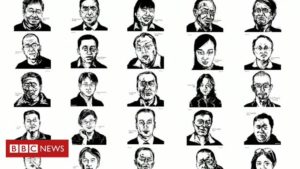
Credit: CDT/badiucao
The one country-two systems formula is already “dead as a Dodo,” said Claudia Mo, a pro-democracy advocate and an independent member of the Legislative Council. Yet protesters are determined to fight on despite a city in lockdown and officials appearing to take advantage, she told ABC News (above).
Today, a group of antigovernment demonstrators gathered — mostly at a safe distance from each other — inside a luxury mall in Hong Kong’s Central district to chant pro-democracy slogans, the Times adds. They were challenging Beijing days after more than a dozen pro-democracy activists and former lawmakers were arrested in connection with the protests that raged in the city last year.
The protest movement hopes to use the June 4 anniversary of the Tiananmen Square massacre, the annual July 1 march marking the 1997 handover, and Parliamentary elections in September to restore momentum lost due to the Covid-19 outbreak. But China’s ruling Communist Party is already in de facto control, says veteran democrat Martin Lee.
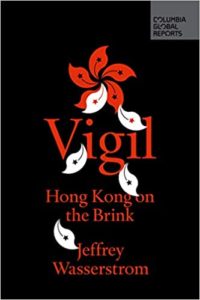 ‘Who is governing Hong Kong now? The Communists,’ the Asian financial hub’s ‘Father of Democracy’ and one of 15 pro-democracy activists arrested last week, told the FT:
‘Who is governing Hong Kong now? The Communists,’ the Asian financial hub’s ‘Father of Democracy’ and one of 15 pro-democracy activists arrested last week, told the FT:
The principle that the Hong Kong people would be allowed to govern themselves was enshrined in Article 22 of the city’s mini constitution, known as the Basic Law, which states that no department of the central government shall interfere in the territory’s internal affairs. But last Friday, Beijing’s highest representative body in the territory, the Liaison Office, insisted it was not subject to this clause in Hong Kong’s constitution.
“Even the most clear wording of the Basic Law can be twisted for the purposes of political expediency. That is dangerous and worrying,” said Johannes Chan, a legal scholar and former law school dean at the University of Hong Kong. Chan compared the Liaison Office’s stance to that of Humpty Dumpty in Lewis Carroll’s “Through the Looking Glass”: “’When I use a word,’ Humpty Dumpty said, in rather a scornful tone, ‘it means just what I choose it to mean – neither more nor less,’” China Digital Times reports.
In recent days, authorities have said for the first time that Beijing’s representative offices in the territory can “supervise” Hong Kong’s internal affairs — a step that legal experts say violates its constitutional firewall with the mainland, notes the Post.
The shift “signals the death of the ‘two systems,’ ” said Eric Cheung, a legal scholar at the University of Hong Kong. “It is quite clear that they are now bringing the mainland system, the mainland idea of supervision and rule of law, here.”
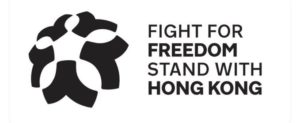 When we are told that the Basic Law restraint on mainland departments interfering in local affairs does not apply to these offices of the central government, we can only wonder what the point of the Basic Law is, adds Michael C. Davis, a former professor of law at the University of Hong Kong, and a global fellow at the Woodrow Wilson International Centre in Washington, DC. The very specific provision in Article 2 of the Basic Law providing for a high degree of autonomy with an independent executive, legislative and judicial power apparently does not mean what it says, he wrote for the South China Morning Post.
When we are told that the Basic Law restraint on mainland departments interfering in local affairs does not apply to these offices of the central government, we can only wonder what the point of the Basic Law is, adds Michael C. Davis, a former professor of law at the University of Hong Kong, and a global fellow at the Woodrow Wilson International Centre in Washington, DC. The very specific provision in Article 2 of the Basic Law providing for a high degree of autonomy with an independent executive, legislative and judicial power apparently does not mean what it says, he wrote for the South China Morning Post.
Unfortunately, the current pandemic has distracted international observers from Hong Kong’s struggle and left many local residents fearful of crowds, notes Jeffrey Wasserstrom, Chancellor’s Professor of History at the University of California, Irvine, and the author of Vigil: Hong Kong on the Brink. And the Chinese authorities know it. The leaders of the Chinese Communist Party—and local Hong Kong authorities who take their cues from Beijing—moved against Lee and the others last Saturday in full awareness that they did so at much lower risk of setting off a major international backlash or large crowd actions than they would have faced just a few months ago, he writes for Foreign Affairs.
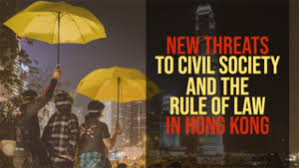
National Endowment for Democracy
The world is failing HK, said dissident artist @badiucao. With @BBCWorld, I illustrated more than 30 human rights lawyers & assistants arrested in China. On 18th April 2020, sadly, I illustrated 15 democracy activists, lawmakers & lawyers arrested over night in #HongKong (above), he tweeted.
“This is a major watershed because it is a fundamental overhaul of the Hong Kong political system and the interpretation of ‘one country, two systems’,” Samson Yuen, a political scientist at Lingnan University in Hong Kong, told the FT:
The Hong Kong Bar Association, the top legal body representing the territory’s barristers, argued the recent comments from Beijing and Hong Kong authorities were “plainly inconsistent” with past statements affirming that the Liaison Office was an office of the central government under Article 22.
“This is the beginning of the end for Hong Kong. If they destroy the rule of law, which they now intend to do with Article 22 . . . everything we have will be gone,” said Jimmy Lai, who founded the city’s most outspoken pro-democracy newspaper in the city and was also arrested on Saturday. “Without the rule of law, we won’t have freedom of speech, we won’t have property rights, we won’t have freedom of religion, we won’t have a lot of things.”
 The National Democratic Institute (@NDI) has released The Promise of Democratization in Hong Kong: Discontent and Rule of Law Challenges, co-authored by Michael C. Davis, Senior Research Scholar at the Weatherhead East Asia Institute at Columbia University, and Thomas E. Kellogg, Executive Director of Georgetown Center for Asian Law.
The National Democratic Institute (@NDI) has released The Promise of Democratization in Hong Kong: Discontent and Rule of Law Challenges, co-authored by Michael C. Davis, Senior Research Scholar at the Weatherhead East Asia Institute at Columbia University, and Thomas E. Kellogg, Executive Director of Georgetown Center for Asian Law.
The culmination of research and assessment work with members of the HK protest movement, the report contains substantive analysis and a series of recommendations to bring an end to the political stalemate and social unrest, including:
• Leadership in Beijing and Hong Kong need to acknowledge the legitimate concerns of the Hong Kong people about the erosion of their rights and the lack of progress on political reform.
• The Hong Kong government should offer to negotiate with representatives from the protest movement and build a framework to increase citizen input.
• The people of Hong Kong should continue to tell the story of Hong Kong’s democracy challenges to governments, parliaments, civil society and the private sector around the world.
• The international community, and in particular the United States and United Kingdom, should continue to publicly and privately raise concerns about the rule of law in Hong Kong to government officials…RTWT
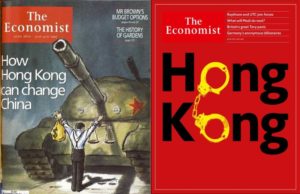 With the rest of the world distracted and China reopening after months of coronavirus lockdowns, Beijing has launched its most brazen effort yet to destroy Hong Kong’s pro-democracy movement, Frida Ghitis writes for World Politics Review.
With the rest of the world distracted and China reopening after months of coronavirus lockdowns, Beijing has launched its most brazen effort yet to destroy Hong Kong’s pro-democracy movement, Frida Ghitis writes for World Politics Review.
House Speaker Nancy Pelosi pointed to the practical steps Washington could take to address Beijing’s escalation, calling on the administration to “swiftly begin implementing” the Hong Kong Human Rights and Democracy Act. If Beijing thought several high-profile arrests would intimidate Hong Kong enough to give up its pro-democracy struggle, it will almost assuredly find it was mistaken, Ghitis adds.
Veteran Hong Kong legislator Lee led a delegation of fellow democrats to Washington, DC, in May 2019 to explain the threats posed to civil society at a National Endowment for Democracy (NED) forum.







